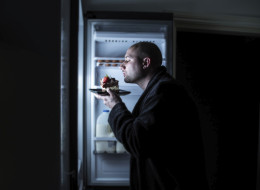That dinner you’ve been putting off until late at night or bowl of ice cream you can’t resist before bedtime could mess with your head.
Experts studying our body’s internal clock have discovered eating at the “wrong time” of the day, especially munching when you should normally be sleeping, may disrupt learning and memory.
It’s something to think about for anyone who likes late-night snacking — and another possible health concern for the 15 million Americans who do shift work.
The research involved mice, but the general principles apply to people, said Christopher Colwell, one of the experts and a professor of psychiatry and biobehavioral sciences at the University of California, Los Angeles.
Even though modern society demands long and odd work schedules, and makes lights and food available 24/7, your body needs to stick to a specific cycle to stay healthy.
“We have this illusion that with the flip of a switch, we can work at any time and part of that is eating at any time,” Colwell told TODAY.
“But our biological systems — that’s not the way they work. They work based on having a daily rhythm.”
The circadian rhythm follows a 24-hour cycle and regulates pretty much everything in our body, from our behavior and the release of hormones to letting us know when it’s time to go to bed.
Disrupting that sleep-wake cycle is bad for your health, Colwell said, noting it can trigger type 2 diabetes and immune system issues. It can also affect cognitive function, especially learning and memory mechanisms. Try giving your brain a workout when you’re jetlagged and you know what that’s like.
Here’s where midnight snacking may become a problem. Frequent late eating is one way to disrupt the sleep-wake cycle, along with being exposed to light at night or doing a heavy cardiovascular workout near bedtime, Colwell said. Traditional societies, like the Mediterranean culture, had it right: They consumed their biggest meal in the middle of the day.
In the experiment, Colwell and his fellow researchers allowed one group of mice to eat when they normally would, while mice in a second group could only munch during their normal sleep time. All of the rodents ate the same amount of food and slept the same amount of hours; it’s just that the second group slept at a different time of day.
After a few weeks of this, the mice were given learning tests, like learning to associate a tone with a shock. It turned out the mice that ate when they should have been sleeping were “severely compromised” in their ability to remember what they learned, Colwell said. They also had more trouble recognizing a new object and showed changes in their hippocampus, a brain region involved in learning and memory.
Colwell, who is getting ready to submit the study for publication, said it’s a reminder that we’re designed to stay on a certain schedule.
“If you’re going on vacation, no big deal. But on the other hand, if you’re in a work environment where you find yourself chronically in situations where your internal clock is being mistimed, then you start having problems,” Colwell said.
Shift workers can adjust to their new “time zone” by consistently staying on one schedule, but many end up working at night during the week and then going back to a day schedule on the weekends, which is devastating on the body, Colwell said. Shift work has been linked to fatigue, depression, cancer and cardiovascular problems.
Bottom line: Having a robust sleep-wake cycle is good for your health and that means eating at the right times, Colwell said.
